Hard lessons can be learnt from biofuels debate
The ILUC debate has been arduous and time-consuming but it is time for the EU to move on and learn from the hard lessons of this divisive policy reform, writes Robert Wright, Secretary General of ePURE, representing conventional and advanced ethanol producers in Europe.
Today the European Parliament is set to adopt a compromise on Indirect Land Use Change (ILUC), finally putting to bed a divisive and prolonged 5-year debate on how to reform Europe’s biofuels policy. Decarbonising EU transport – whose emissions have steadily increased - is vital, as is ensuring that Europe uses only the best biofuels, but the policy making process accompanying ILUC has not efficiently dealt with these issues. Valuable lessons can be learnt going forward to ensure that Europe fully capitalises on the benefits of sustainable biofuels.
The Commission’s 2012 proposal to cap the contribution of conventional biofuels to the EU 2020 targets, together with statements that these biofuels should no longer be supported post 2020, was a dramatic policy U-turn, only 3 years after the existing biofuels policy was agreed. This set a very negative tone from the outset of this reform. Existing investors were unfairly and negatively affected. Investments and jobs were lost. Future investors shelved projects or moved them to other parts of the world where there are more stable and predictable policy frameworks. The delay in the EU institutions finding an agreement has compounded the overall policy uncertainty.
In this respect, ePURE has consistently advocated for a swift and balanced closure of the ILUC file in order to restore regulatory and market certainty and we therefore welcome progress towards a conclusion of this file. The compromise contains several positive additions, including raising the cap for conventional biofuels to 7% of all transport fuels, the recognition of low-ILUC biofuels, and opens the door to the promotion of sustainable biofuels after 2020.
However, fundamentally, the process to close this file has lost sight of its overall objective: to promote the best-performing biofuels. Specifically the absence of binding targets for advanced biofuels and renewable energy (ethanol) use in petrol - key measures to differentiate between better biofuels – and supported on several occasions by all the political groups in the Parliament - undermines the core objectives of this reform.
A binding yet realistic sub-target for advanced biofuels, together with clear definitions of feedstocks for advanced biofuels, is the only instrument that will stimulate investments in truly advanced biofuels before and after 2020. The removal of the renewable energy in petrol sub-target proposed by the Parliament will inevitably mean that the vast majority of the 7% cap will be filled by biodiesel. As ethanol has low ILUC impacts and higher GHG savings, achieving on average 60% GHG savings compared to petrol, this is a missed opportunity to differentiate between biofuels.
The non-inclusion of these items represents a real missed opportunity to amend this legislation in a meaningful way that is consistent with the aims of the Commission’s original proposal. EU policy makers must therefore address these gaps as part of the envisaged review of the Renewable Energy Directive by end 2017, as well as during the definition of the post-2020 energy and climate framework.
There is a real danger that when the compromise becomes law, it will lead to the fragmentation of the European biofuels market as it leaves too many provisions up to the discretion of Member States, such as the cap on conventional biofuels and aspirational targets for advanced biofuels. This will inevitably lead to different rules in different Member States and could once again create uncertainty in the market. To reduce such uncertainty, we recommend the harmonization of the internal market for the fuels available to motorists across Member States. The EU-wide roll-out of E10, a petrol/ethanol blend used widely in Finland, France and Germany, would support the objective of a more complete internal fuel market and also ensure Europe capitalizes on the well-known air quality and environmental benefits of petrol/ethanol blends.
A key lesson from this debate is that Europe should commit itself to the legislation it sets, otherwise it will continue to lose investments and the technological advantage over its rivals. This is particularly true given that Europe has been a leader in advanced biofuels technologies for many years, but our companies invest in the US because they no longer trust the policy stability in Europe.
With the definition of the 2030 Climate and Energy framework there is a real window of opportunity for European policy makers to commit themselves to a stable, consistent and forward looking biofuels policy that promotes low ILUC biofuels, such as conventional and advanced European ethanol. Our industry is ready to play its part in helping achieve Europe’s 2030 ambitions. We call on EU policy makers to provide a stable and predictable pathway to ensuring the 2030 Strategy meets its targets.
